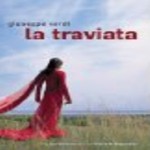This performance was recorded in July 2008 at the Opernfestspiele St. Margarethen in Austria. The outdoor setting is stunning–it is a massive Roman quarry with mountains visible in the near and far distance–and apparently this Traviata is the first opera they’ve done without wild animals in residence (Nabucco, Aida, and Carmen have been shown in recent years). The sets are lavish enough to make Franco Zeffirelli blush. Designer Manfred Waba has placed the action in a reproduction of the Paris Opera, complete with stage boxes inhabited by patrons in their fanciest clothing who watch along with us. There is more gold than anyone would know what to do with.
But the playing area is manageable (director Robert Herzl has avoided using the huge stage as it is used in, say, Verona; characters are within walking distance of one another), and while “intimate” is not a word that comes to mind, neither is “detached”. For some reason–sheer prurience, perhaps–the Gypsies in the Party Scene are men in Flamenco drag, but otherwise the evening is traditional. Costumes are exquisite if over-the-top (Waltraut Engelberg is credited), and the director has kept the action clear and easy to follow. Having Alfredo sing “Di miei bollenti spiriti” to a silent but friendly Dr. Grenvil while they share a glass of wine is a nice touch.
Heading the cast as Violetta is Kristiane Kaiser, an attractive woman and a good enough actress, with a big, full lyric voice. Her singing is effortless and every note is secure; her soft singing impresses with its accuracy and beauty. She and all the other characters are wearing tiny but visible microphones in their hair, hanging down onto their foreheads; I wonder how this effects what we hear. Hers is a fine portrayal, missing only a unique timbre and outlook to make it special.
Her Alfredo is the light-voiced Jean-François Borras, a young man with a Nemorino-like voice and a none-too-easy way on stage. Sporting a simply vile haircut (his own, I believe), he is vocally lovely in the gentler sections (both duets with Violetta) but has little effect in the gambling scene, where he appears merely petulant and lacks volume. The veteran baritone Georg Tichy as Germont, now in his mid-60s, looks and sounds near retirement–short of breath, dry of tone. The others in the cast are good enough, but occasional close-ups make us realize that this is one of those festivals where everyone in town is hired as supernumerary; lots of confused, awkward looks ensue.
Ernst Märzendorfer leads an absolutely uncut version of the score, and his singers and players have been superbly rehearsed. But his leadership is foursquare–Teutonic in all the wrong ways–with little or no rubato for effect, and as a result, Violetta’s “Amami, Alfredo”, sung in a hurry, has little punch. Neither does her heartbreaking melody in the gambling scene, nor the moments before her death, which she seems in a hurry to get to.
Picture and sound are crystal clear, camerawork is good, and subtitles are provided in all major European languages. In short, this is a sumptuous-looking Traviata with some good singing, but it cannot compare with the competition: the remarkable Netrebko/Villazon performance from Salzburg, or a more traditional, less-imaginative Fleming/Villazon version from Los Angeles.
































